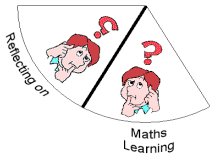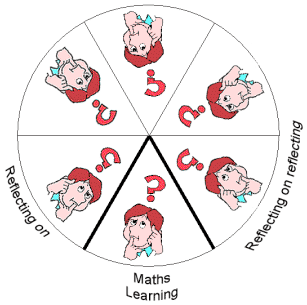Researcher: Alex Neill
Context: computational estimation (Year 8)
Written journals were investigated as a way for students to reflect on their learning. For the last 5 to 10 minutes of a series of mathematics lessons the students wrote a journal entry about that day's learning.
Key areas of journalling
All the students had ideas on what kinds of things they would record in their journals.
-
What I did or what I learnt
-
Help that I need or things I need to do or learn more of
-
Feelings, either what I enjoyed, found good or didn't enjoy, or how I was feeling
-
Useful or interesting things
-
Easy things or things I already know
-
Things about my learning (emerging metacognition).
Benefits of journalling
The research indicated many benefits of journalling.
For students
-
It refines their thinking about mathematical issues.
-
It gives a lasting record for the student to look back at.
-
It is therapeutic for them to express their feelings.
-
It can help clarify the meaning and content of the mathematics.
-
They can reflection on how they learn.
-
Metacognition. It helps students to think about their own thinking.
-
It aids self-regulated learning.
For teachers
-
It gives diagnostic and formative information about your students.
-
It helps you evaluate own teaching and planning both short- and long-term.
For student and teacher
-
It helps set upcommunication, feedback, and dialogue between you and the student.
Reflecting on journalling
During the research the students were asked to write in their journals how they had found the journalling experience. This was followed up by an oral discussion. Here are some quotes from the students' journals.
Remembering
"When I write it reminds me effortlessly of everything (that) goes through my mind."
Reflecting
"I think it's really good because I can reflect back on what I've learnt and I sometimes read it over again."
"It is good to know what I need to improve on."
Recording
"I think it's really good . It inspired me to do more stuff because with it in my book I can . always look back and feel happy that I've learnt lots of new stuff."
Organising mathematical ideas
"By writing something down I can confirm that I know it rather than going away not knowing whether I can do it or can't do (it). Writing something down eliminates the uncertainty."
"There were experiences that I was not quite sure what I thought of them and when I actually had to think (of what to write) I had to come to a definite answer."
Feelings
"I reckon journal writing has helped me because I think it's the way I express my feelings towards maths."
"I didn't think it would help but it does."
My learning style
"Writing in a journal helped me learn because I learn by seeing not really hearing. I learn new ideas by seeing and by doing and practising."
"I used to just learn, but now I know that writing it down helps me learn."
Thinking about my thinking
"When you write you think how you learn."
"You can write things you can't think and think things you can't write."
"It's a way to think things over, gather thoughts, and write them down."
Reflecting on reflecting
When the students wrote their journals they focused mainly on the mathematical side of their learning. This could be seen as holding up a mirror to their learning (the heavy black line in the diagram below). A single image of the learner appears.

However, when they reflected upon how journalling had affected them, they made far more comments showing that they were now thinking about their thinking (metacognition).
This consciousness of how they learn is a key component to becoming self-regulated learners.
This can be seen as holding up a second mirror that looks on the journalling process itself. Now a kaleidoscope of images of the learner appear, showing the richness of reflecting (either orally or in the journal itself) on what it is like to keep a mathematics journal.

Recommendations
-
Keep a mathematics journal. It helps mathematics learning. It doesn't need to be after every lesson, but should be at least once a week.
-
Give active feedback by writing in students' journals or in discussion/conferencing with them.
-
Scaffold students on how to write journals. This is a transactional writing task.
-
Reflect with your students from time to time how the journals are going. This could be done orally or in writing. This helps the students think about their thinking and learn about their learning.

